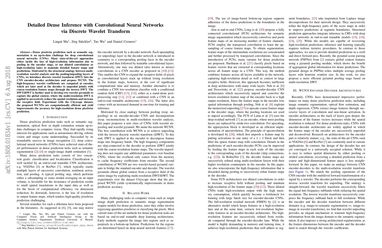Detailed Dense Inference with Convolutional Neural Networks via Discrete Wavelet Transform
Dense pixelwise prediction such as semantic segmentation is an up-to-date challenge for deep convolutional neural networks (CNNs). Many state-of-the-art approaches either tackle the loss of high-resolution information due to pooling in the encoder stage, or use dilated convolutions or high-resolution lanes to maintain detailed feature maps and predictions. Motivated by the structural analogy between multi-resolution wavelet analysis and the pooling/unpooling layers of CNNs, we introduce discrete wavelet transform (DWT) into the CNN encoder-decoder architecture and propose WCNN. The high-frequency wavelet coefficients are computed at encoder, which are later used at the decoder to unpooled jointly with coarse-resolution feature maps through the inverse DWT. The DWT/iDWT is further used to develop two wavelet pyramids to capture the global context, where the multi-resolution DWT is applied to successively reduce the spatial resolution and increase the receptive field. Experiment with the Cityscape dataset, the proposed WCNNs are computationally efficient and yield improvements the accuracy for high-resolution dense pixelwise prediction.
PDF Abstract

 Cityscapes
Cityscapes